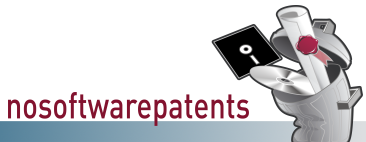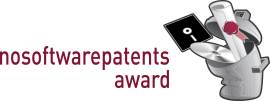| English | Deutsch |

![- Logo]](../images/layout007-small.png)
| Home |
| Software Patent of the year 2006 |
| About |
| Supporters |
| Background |
| News |
| Press November |
| Links |
| Contact |
| Imprint |
Background
June/July 2006New direction towards enforcement of software patents. After the rejection of the EU-directive in 2005 the topic of software patents has not disappeared from the agenda. There are still thousands of such patents. Their number is increasing steadily as the European Patent Office (EPO) grants them and declares them valid – also when appeals are registered.
Recently the EU-Commission has introduced a new round in the fight about the politics on software patents with its initiative on the future patent policy. The regulations which may arise from this could – according to expert opinion – open the doors for floods of software patents and legal actions against patent infringements. In the first stage of this initiative the EU-Commission has invited interest groups to pronounce their opinions by filling in a questionnaire, in order to establish a basis for the public hearing in Brussels of 12 July 2006.
In the course of the EU-Commission's preparations of the hearing the importance given to the so called EPLA (European Patent Litigation Agreement) is increasing, while the community patent, discussed for many years is fading into the background. In the course of the commencement of the EPLA there would be established a European Patent Court (EPC), which would degrade the national courts to unimportance. "In contrast to national courts, which currently decide on patent infringements, the EPC would – with the utmost probability – share the philosophy of the EPO concerning software patents. The EPC would sustain software patents which are currently declared illegitimate by national courts", says Florian Müller, expert on software patents. Besides, the judges of the EPC would be appointed by exactly those authorities which negotiated the EU-directive rejected in 2005. According to Florian Müller it must be expected that such an EPC would rather be favourably disposed towards patent proprietors than to those which defend themselves against legal actions for patent infringements.
All at once the decisions of the EPC on the validity and the infringement of a particular software patent would take effect in all European countries, in which the patent were granted (until today there are only individual national decisions). A number of signals generated by large corporations, national patent courts, the EPO, patent attorneys and the EU-Commission itself indicate that the EPLA is now going to be pushed.
Remarkable are the parallels to the USA, where more than 20 years ago comparable steps were taken towards centralised regulations for litigation. These regulations are effected by the "Court of Appeals for the Federal Circuit", a court specialised on patent law. The result was a flood of software patents and of legal actions against patents.
February 2006
The controversy concerning the issue of software patents continues, even though the critics initially succeeded last summer. For the time being, the fact that the European Parliament rejected the EU directive on July 6th, 2005, has prohibited the legalisation of computer-related patents. At the same time, the opportunity to adopt the "21 amendments" in order to put a definite stop to the granting of software patents via loopholes in the legislation was not availed of.
As a consequence, the general legal uncertainty in Europe still prevails: Companies in the possession of software patents are not able to use them to their economic advantage, because according to the European Patent Convention of 1973, which continues to be in effect, business methods and programs are not patentable. However, this regulation has been reinterpreted time and time again since the eighties, in combination with attempts to blur the boundaries of patentability. While this was going on, the European Patent Authority (EPA) awarded countless software patents.
There is nothing to indicate that the European Parliament's rejection of the EU directive has had or will have any impact on the granting of software patents by the EPA. Therefore, critics not only fear new software patents, but first
and foremost renewed attempts to enforce software patents, for
example by means of community patents, which are valid throughout the EU. This could imply the subsequent
legitimisation of thousands of software patents previously granted
by the EPA.
| Previous Software Patents of the Month |
| > September |
| > August |
| > July |
| > June |
| > May |
| > April |
| > March |
| Press Archive |
| > Oktober |
| > September |
| > August |
| > July |
| > June |
| > May |
| > April |
| > March |
